From Nordic songs to Nature’s spirit: after a day which focused on the music of Wilhelm Stenhammar and his Scandinavian compatriots, the fourth day of the Oxford Lieder Festival turned to more familiar French and German art song, exploring man’s relationship with the natural world which surrounds him and Nature’s own music.
I attended the first of the evening’s two performances by tenor Ian Bostridge and pianist Dame Imogen Cooper of a programme entitled Over Silent Lands, which placed the yearning of the poet-speaker in Beethoven’s An die ferne Geliebte – a longing expressed through poetic and musical imagery conveying the time and space that separate the protagonist from his ‘distant beloved’ – alongside the strange temporal juxtapositions and psychological uncertainties of Schumann’s Liederkreis Op.39 – in which the protagonist (or should that be protagonists?) frequently succumbs to Nature’s disorientating sounds and light, becoming detached from his immediate time and space, lost in the fantasies of his subconscious.
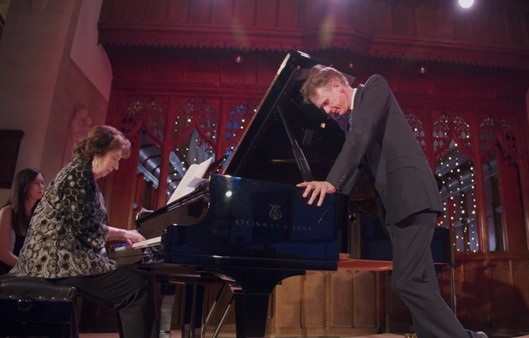
Bostridge emphasised the introversion of the protagonist in An die ferne Geliebte. The leisurely tempo of the opening song, ‘Auf dem Hügel sitz ich spähend’ (I sit on the hill, gazing), evoked the dreamy self-absorption of one who, looking across the misty blue meadows, ‘sees’ only his beloved – a dreaminess deepened by the tenor’s customary listing motions, and leans into the piano. The mezzo piano dynamic and even phrasing enhanced the stillness, and initially it was Cooper’s songful variations of the strophic repetitions which brought movement to the song, although the tenor’s characteristic engagement with textual detail and inference soon injected emotional tension – as when, with firmer voice, Bostridge emphasised the mental and physical pain caused by the expanse between lover and beloved: “Und die Seufzer, sie verwehen/ In dem Raume, der uns teilt.” (And my sighs are lost in the space that comes between us.)
The acceleration of the closing phrase, in which the protagonist imagines that his song can literally join two separated hearts, seemed driven by hope rather than conviction, and Cooper’s long-held fermata and delicate modulation did not so much as bridge the distance as confirm the speaker’s self-delusion. The soft quality of the vocal timbre, and subtle distortions of the pitch, in ‘Wo die Berge so blau’ (Where the blue mountains) only added to the wistful ‘unreality’ of the moment, as the monotone on which the poet-speaker reflects upon the peace that exists in the valley below faded to a whisper. Thus, the insistent closing repetition of the wish for eternal union seemed unnervingly forceful, and the subsequent staccato quavers of ‘Leichte Segler in den Höhen’ (Light clouds sailing on high) took on a tense quality. The subtle holding back of the tempo with the modulation to the minor key – and the pained heightening of the image of the fading sun, “Wie der Sonne letzter Strahl” – only added to the foreboding, and the vehemence with which Bostridge asserted that the clouds, birds and brook would carry his loved one back to him, at the close of ‘Diese Wilken in den Höhen’ (These clouds on high) was brusque and angry.
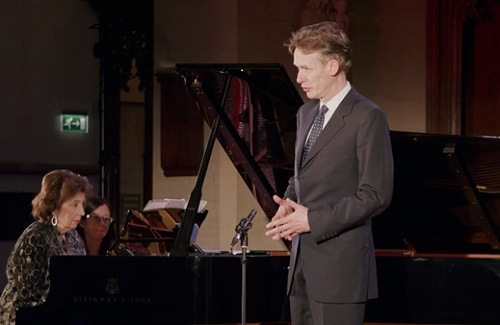
‘Es kehret der Maien, es blühet die Au’ (May returns, the meadow blooms) may tell of Nature’s nourishment and nurture, but this protagonist’s gaze seemed turned inwards, his gentle song intended not to glorify the outer world but to assuage the inner – and the merest flattening of the pitch in the slow repetition of the closing phrase, “Und Tränen sind all ihr Gewinnen” (And tears are its only gain), served to sharpen the bitterness. “Accept, then, these songs,” the speaker implores the beloved in the final song, ‘Nimm sie hin denn, diese Lieder’, but Cooper’s beautiful cantabile could not wholly sooth the unease, and as the sun faded behind the mountain, time seemed to stand still, Bostridge’s gentle head voice merging with the piano’s quiet repeating throb. The protagonist truly did seem aware solely of his own yearning, “Nur der Sehnsucht sich bewußt”, and with the return of the melody of the opening song it seemed through the sheer forcefulness of his heart’s faith, eternal union would come.
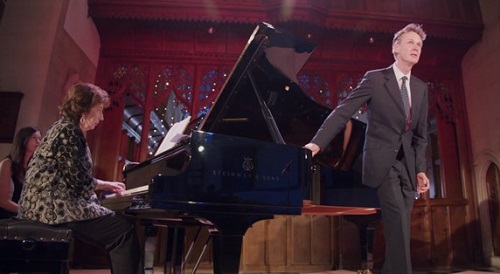
After Alois Jeitteles’ hilltops, pastures, valleys, brooks and clouds, Schumann’s Liederkreis Op.39 gave musical form to Joseph Freiherr von Eichendorff’s rustling forests, red lightning, ruined castles, murmuring brooks and nightingales’ songs of solitude. The wheel of time turned inexorably in ‘In der Fremde’ (In a foreign land), Cooper’s ceaseless semi-quavers unfolding with wonderfully expressive flexibility as the protagonist was carried away from his homeland, ever onwards, towards death – Bostridge’s tightly twisting grace notes emphasising the painful ache of loneliness and loss. A portrait of the poet-speaker’s beloved provided some alleviation of grief in ‘Intermezzo’ in which Cooper’s gentle syncopations were lovely support for Bostridge’s sweet, relaxed vocal line. But, there was unrest in ‘Waldesgespräch’ (A forest dialogue), conveyed through the duo’s exploitation of rhythmic gestures, chromatic wanderings and modulations, and when the protagonist encountered the enticing Lorelei, her initial graciousness swiftly turned to disdain, Bostridge almost shouting her warning, “Es is schon spat, es ist schon kalt,/ Kommst nimmermehre aus diesem Wald!” (It is already late, already cold,/ You shall never leave this forest again!)
The wanderer seemed fickle, false and wry in ‘Die Stille’ (Silence), the bitterness enhanced by Cooper’s dry staccatos, but the moonlight was consoling (‘Mondnacht’), the piano’s delicate falling figures and lightly pulsing chords a beautiful cushion for the finely wrought vocal line. Again, though, the tempo seemed quite slow, intimating a weariness that, despite the slight injection of movement in the final stanza, might afflict the soul as it takes flight and wends homewards across the moonlit land. ‘Schöne Fremde’ (A beautiful foreign land) pushed Bostridge’s tenor higher than it seems to want to go these days, but the venturing into the ruined castle and encounter with the old knight, now turned to stone, in ‘Auf einer Burg’ (In a castle) – and the strange temporal appositions – drew intense, disturbing painting of inner and outworlds from Bostridge. The poignant closing tierce de Picardie conveyed a terrible human vulnerability.
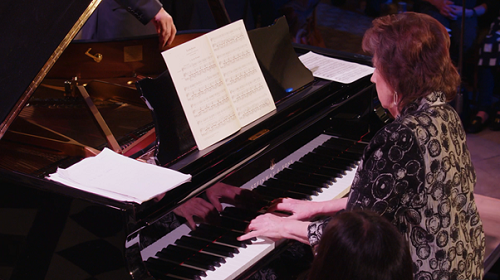
The second of the songs titled ‘In der Fremde’ bristled with an agitation triggered by Nature’s flickering murmurs and sparks, while ‘Wehmut’ (Sadness), lying within the octave where Bostridge’s tenor rests most easefully and sweetly, truly captured the paradox between the beauty of the song and the sorrow of its sentiments. Cooper spun the spidery gleam of twilight with exquisite sensitivity at the start of ‘Zwielicht’, but Bostridge had a dark warning for us at the close, almost spitting out the final, low, whispered admonition, “Hüte dich, sei wach und munter!” With the approach of spring, fulfilment was found, however, and at the close of the final song of Schumann’s cycle, ‘Frühlingsnacht’, Bostridge’s protagonist was, at last and persuasively, invigored by fresh energy and conviction. Eichendorff also provided the text for the duo’s encore, Hugo Wolf’s ‘Verschwiegene Liebe’ (Silent Love), in which all the evening’s doubts, fears and conflicts were dissipated by perfect happiness.
The concert began with the customary ‘Emerging Artist’ slot in which soprano Siân Dicker and pianist Krystal Tunnicliffe presented a well-chosen sequence of songs by Mendelssohn, his sister Fanny, and Clara Schumann. In recent years, I’ve admired Dicker’s confident stage presence and strong, bright soprano in several opera productions at the Guildhall School of Music and Drama, and she opened her programme with impressive assurance, capturing the heightened emotional tension of Mendelssohn’s ‘Neue Liebe’ and, by contrast, the reserved melancholy of ‘Schilflied’ (Evening) in which the phrases were attractively shaped, showing a good command of line and control of dynamics. Fanny Mendelssohn-Hensel’s ‘Italian’ danced exuberantly, and here Dicker’s natural feeling for musical character and situation came to the fore, particularly in the over-excited exclamations of the close. Kristal Tunnicliffe was a supportive and eloquent accompanist, especially so in Clara Schumann’s ‘Liebst di um Schönheit’ (If you love for beauty), in which the smooth evenness of the vocal phrases was extended in an expressive piano postlude, and in the extended musical storytelling of the composer’s ‘Lorelei’.
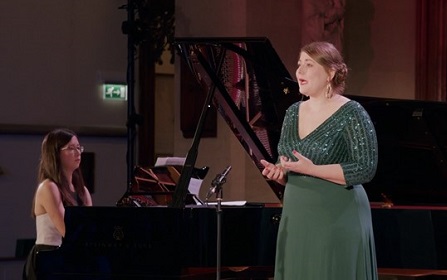
Earlier in the day, St John the Evangelist had hosted a lunchtime recital given by the Guyanese soprano Marie-Laire Garnier and the French pianist Célia Oneto Bensaid. The duo began their programme of twentieth-century French repertoire with a sequence of melodies by Francis Poulenc. There was a lovely sense of spaciousness and stillness at the opening of ‘Nous avons fait la nuit’ (We have created the night), the final song of the song-cycle Tel jour, telle nuit (1937)whichsets nine poems by the surrealist poet Paul Éluard. Garnier’s soprano is ample and lustrous, and she employed its smooth richness to convey the poet-speaker’s ardour as he confesses his love and faith to his wife, all the while sustaining a necessary lightness of touch in crafting Poulenc’s brief phrases. In the long piano postlude, Bensaid captured the poet’s mood of wonder, as he marvels at his beloved’s capacity to grow and renew herself, slowly relaxing the intensity and closing with serene grace.
Another Éluard setting, ‘Main dominée par le coeur’ (Hand ruled by the heart, 1946) followed, and here Garnier first soared with powerful lyricism, then held back, as she shaped the poet’s diverse images. Bensaid’s pedalling sustained the airy textures beautifully, most especially in the delicate passagework of the postlude. The religious fervour of ‘Priez pour Paix’ (1938) was balanced by a calm tranquillity while in ‘Les anges musiciens from Poulenc’s last set of songs, La courte paille (1960) Garnier found much nuance within the narrow-ranging phrases, creating moments of intensity and beauty.
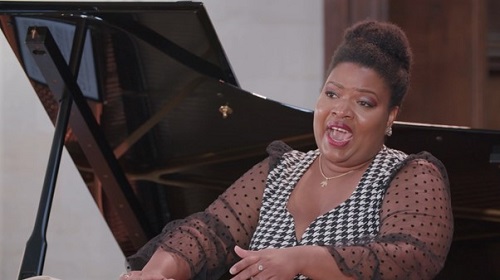
Bensaid’s performance of ‘Oiseaux tristes’ from Ravel’s Miroirs was exquisitely transparent, the traceries etched with an increasingly crystalline touch, as if the light was sharpening its focus. It was a lovely palette-cleanser for Messiaen’s Poèmes pour Mi which were composed in 1936 for his first wife, the violinist and composer Claire Delbos. Messiaen’s texts are full of extravagant images and fierce declarations which bring together the passion of conjugal love and of religious faith. Garnier’s diction was superb, and she had a strong feeling for the architecture of each song – building persuasively, for example, towards the spiritual rapture which concludes the first song, ‘Action des grâces’ – and for the drama of the whole sequence. Vocally, she was very secure, the tone smooth and sweet – just occasionally, when both dynamic and register rose, did she push her soprano a little too hard, misjudging perhaps the church’s helpful acoustic, and it acquired a slightly harsh edge.
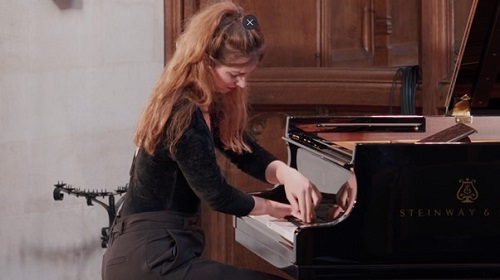
Bensaid was unfailingly responsive to the soprano’s interpretative nuances, relishing the piano part’s many colours, and the contrasts and extremes of the cycle were effectively exploited. The image of transfiguration which closes ‘La Maison’ descended with soft reverence, only to be swept aside by the fierce richness of ‘Épouvante’ (Terror). After the turbulence and violence of ‘Les deux guerriers’ (The two warriors), ‘Le collier’ (The necklace) was beautifully rapturous, the repeated exclamation, “Ah! mon colliers” shining and vivid, the vocal melismas at the close sustained by blissfulness. The contrasts and oppositions carried the cycle forward convincingly towards the final song, ‘Prière exaucée’ (A prayer granted) which evinced a sense of freedom and release.
The rather short programme was pleasingly extended by three encores which journeyed through contrasting moods: from the Bach-inspired serenity of Reynaldo Hahn’s ‘A Chloris’, through the languorous contentment of Poulenc’s ‘Hôtel’ from Banalités (1940) and, finally, to the tender sadness of Faure’s ‘Les Berceaux’.
The second performance of Over Silent Lands was streamed live in the OLF Digital Concert Hall and is available on demand (£).
The 20th Oxford Lieder Festival continues until 23rd October.
Claire Seymour
Over Silent Lands: Siân Dicker (soprano), Krystal Tunnicliffe (piano), Ian Bostridge (tenor), Dame Imogen Cooper (piano)
Mendelssohn – ‘Neue Liebe’ (from Six Songs Op.19a), ‘Schilflied’; Fanny Mendelssohn-Hensel – ‘Italien’; Clara Schumann – ‘Liebst du um Schönheit’ (from Zwölf Gedichte aus ‘Liebesfrühling’), ‘Lorelei’; Beethoven: An die ferne Geliebte Op.98; Schumann – Liederkreis Op.39
St John the Evangelist, Oxford; Monday 11th September 2021.
Poèmes pour Mi: Marie-Laure Garnier (soprano), Célia Oneto Bensaid (piano)
Poulenc – ‘Nous avons fait la nuit’ from Tel jour, telle nuit, ‘Main dominée par le cœur’ (FP 135), ‘Priez pour paix’ (FP 95), ‘Les anges musiciens from La courte paille’; Ravel – ‘Oiseaux tristes’ from Miroirs; Messiaen – Poèmes pour Mi
St John the Evangelist, Oxford; Monday 11th September 2021.